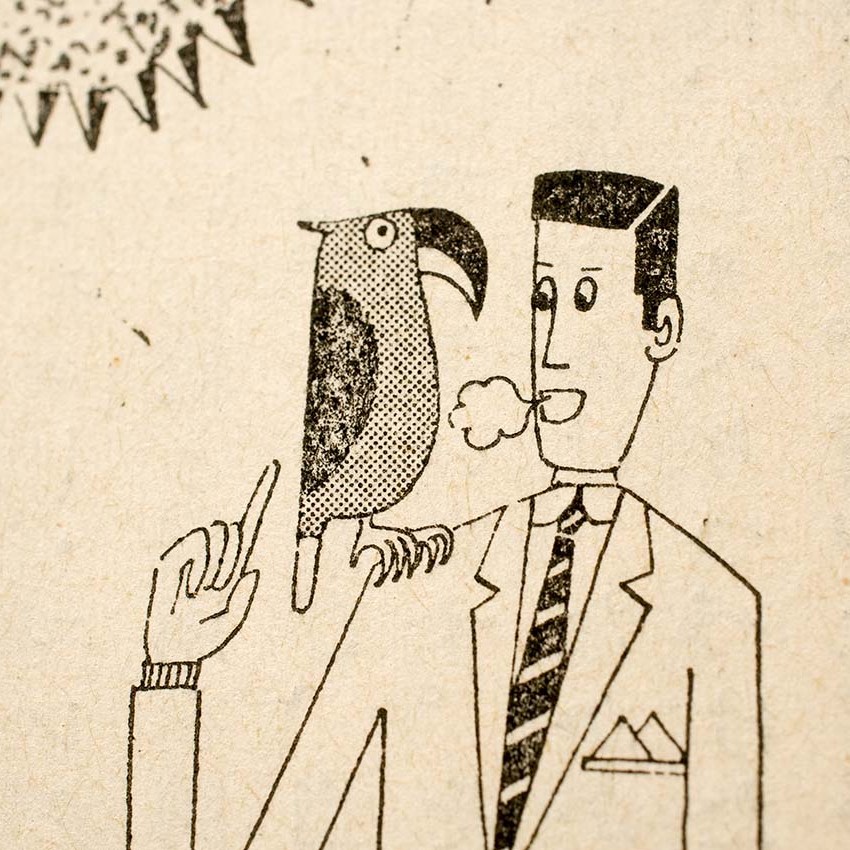Is It Bad to Have a Parrot Speak for You?
Retro sci-fi stories and how they can help with Reddit rants
Marco Giancotti,

Marco Giancotti,
Cover image:
Drawing by Manabe Hiroshi, Shincho Bunko
I often have reason to lie down in a noisy box for entire mornings, engaging my brain in various activities. Lately, the main activity has been listening to short stories through a pair of earphones—each story multiple times. This has been one of the most enjoyable experiments I've experienced, as reading is something I would be doing anyway. These sessions are never dull, especially because the selection of stories I get to hear is quite good.
They are all by a famous Japanese science fiction writer named Hoshi Shin'ichi, who was very active—he wrote over a thousand stories—in the latter half of the 20th century. None of them is longer than ten pages, and most are much shorter.
Hoshi's stories have a light-hearted, uncomplicated worldview. They are all G-rated and sometimes read like children's stories—which is completely fine with me. They deliver what Sci-Fi from the 70s should deliver: astronauts commuting around the Solar System but writing home with "portable typewriters," AGI robots using wired telephones, and other delights like that.

Sometimes Hoshi's predictions come eerily close to today's reality. In one story, titled "The Era of Advertisements," he envisions a world where people can sell their "reflexes" to ad companies. Everyone, of course, does it: a child automatically sings the theme song of a cookie brand every time someone strokes his head, a man praises a health supplement product every time he yawns, and an elevator girl talks about a soft drink whenever someone kisses her—which the protagonist, a random stranger, can't help doing when he rides with her on the elevator (ah, Japan in the 70s must have been something else). Given the state of YouTube today and the recent advancements in brain-computer interfaces, I am now terrified.
There was one story, though, that stood out to me more than the other thirty or so I listened to (spoiler alert). In this version of the future, a new amazing technology has taken the world by storm: talking parrots. Everyone now has one of these on their shoulder, and they function as what you could call "etiquette translators." People don't talk to each other directly anymore, but whisper their unfiltered thoughts to their parrots, which then rephrase them into polite, socially-appropriate sentences for the interlocutor to hear.
The short story's title is "Shoulder-Top Secretary." A door-to-door salesman—whose mode of transport is a pair of self-propelling roller skates—is trying to sell a gadget to a "housewife."
He whispers to his parrot, "I'm here to sell," and the parrot announces clearly, "A very good morning to you, Madam! Allow me to introduce myself, I'm XYZ from ABC Inc., and I have the most amazing new product with me that you won't be able to do without!"
The woman's parrot hears that greeting and translates it back to the woman: "he wants to sell you something," to which the woman replies in a low voice, "what is it, already?" The parrot converts it to: "Oh, it's a pleasure to meet you, Mr. XYZ. I've heard so many good things about ABC Inc., in fact, I've desired your products for a long time! But tell me, what do you have to offer me today?"
The farce goes on like this for a while, with each of the two humans secretly annoyed with the other's company and the parrots carrying out an amiable and cheerful conversation in their stead. The woman isn't interested in the gadget at all, and her parrot eventually succeeds in sending the man away with promises to "discuss it with her husband, because she really wants it but can't decide without consulting him first."
The first time I listened to this story, I thought it was a funny satire of Japanese society, with its deeply ingrained divide between honne and tatemae, or "what you think" and "what you actually say." Although this divide exists in most cultures I know of, it is sharp and almost institutionalized in Japanese culture. I remember thinking that "Shoulder-Top Secretary" would be difficult to fully translate into English, because of the stark difference in language between what the characters whisper and what the parrots say (Japanese has different verbs and word structures for the two modes of speaking, basically two different sub-languages).
Still, this was only a curiosity, and I quickly forgot about it when the next story streamed through my earphones.
Then, yesterday, the same story came up in my experiment again, and this time I recognized what was really interesting about it. It seems like another one of the author's accurate predictions of today's world.
Only a few days ago, I happened to read a post on the r/ClaudeCode or r/Claudeai subreddit (for the life of me I can't find it again) about some issues the poster had had with Anthropic's coding tool. It started with this preamble, obviously patched on after the initial submission (I paraphrase):
EDIT: for those who are accusing me of using AI to write my post, of course I did. I spoke my thoughts in a disorganized way and had a model tighten the wording. This is the future, guys, get used to it.
(...then the actual post)
Looking at the comments below the post, there were indeed several people complaining that the post was clearly written by an LLM. It had all the telltale signs: the ample use of bold and em-dashes, the neat structure, the admirable eloquence. Some commenters wrote things like "Thank you ChatGPT," while others directly reprimanded the poster (still paraphrasing): "If you need a robot to write your opinions, you're really finished."
This wasn't the first time I read criticism of AI-generated content. AI slop is taking over the internet, and people are noticing. Today's foundation models tend to have rather repetitive patterns (e.g. not X, but Y) and quirks that get boring fast. Many people are wondering if we can trust anything at all anymore. I get it.
But this case was a little different. It was a post about someone's opinions on a forum of generative AI lovers. Most of those people pay US $100 or $200 for monthly subscriptions to have LLMs write code and do tasks for them. Yet they were getting into arguments about the morality of using AI to reformulate their words.
Now, side-quibbles on rant posts on Reddit are not my preferred source for the state of society, but this struck me as interesting and worth thinking about a little longer.
Is using a language model to "tighten your wording" morally shady? I don't use it for my own blog posts and essays beyond grammar and punctuation checks, but I do (openly) output AI-written documents for my day job, like reports, proposals, policies, and cookie-cutter emails. Am I doing something reproachable? Are my colleagues secretly resenting me for that?
I don't think so, as long as I take full responsibility for whatever I actually deliver. I have been guilty of not checking a document thoroughly enough at least once, and that led to more work for the person who had to review it. But that was a human's error—mine—not the machine's. The problem was not that I used an LLM, but that I used it sloppily. It is clearly a tool with a learning curve, and I can understand someone being tired of being surrounded by too many sloppy tool-users, especially when that is done in secret.
But, again, the Reddit thread seems to present a different issue: even after the poster openly admitted to using AI to write his post and stood by what he wrote, some people remained critical of his practice. Were they right?
I think this lingering question in my mind is why "Shoulder-Top Secretary" resonated with me differently the second time around. It offers some clarity on this particular doubt.
Admittedly, the world envisioned by Hoshi doesn't seem very appealing. Everyone communicates indirectly, entirely through their parrots. But why exactly is that bad? Is it because the communication is indirect?
A good argument could be made for a "yes". One could say that the effort of being polite with your language and exchanging pleasantries is what's valuable, not the exact words used. The role of ornate and gentle speech, even if bland and trite, shows your respect for the other person. The medium is the message.
The story ends with the salesman, tired and depressed after an unsuccessful workday, entering his favorite cocktail bar. The lady bartender welcomes him warmly. Or rather, her parrot welcomes him, because we don't hear what she actually whispered. It says: "I've missed you, darling. You know, it's so lonely here when you're not around!"
That's a neat ending for this three-page skit. It leaves you wondering what the cocktail lady really thinks—or rather, it leaves you knowing exactly what she thinks, without actually spelling it out.
The real question, though, is this: would those same words of welcome have carried a different weight if the lady had said them with her own lips?
I like the story for what it is. It's fine. But I think the author pulled a sleight of hand on the reader with this one: it only ever shows people who are negative and irritated with each other. The "housewife" doesn't want the gadget, the salesman doesn't like his job, his boss thinks he's a loafer, and naturally, we're led to believe the bartender probably doesn't care for the man as much as she claims to.
This kind of negativity does exist aplenty in our real, modern world, but it's not that ubiquitous. People actually like each other sometimes, and they actually want to say what they think without polite inversions. "Shoulder-Top Secretary" only shows us people on their bad days when they think thoughts that can't be spoken plainly.
This story leads us to another viewpoint on the question raised by the Reddit thread: perhaps the medium is the message, but that message is often a lie. If it's a lie, it shouldn't matter what the medium is. And if it isn't a lie, what's the problem? ●
Cover image:
Drawing by Manabe Hiroshi, Shincho Bunko
